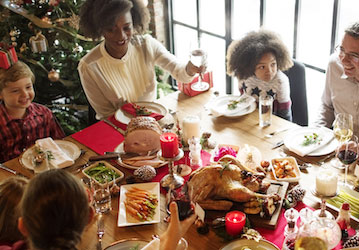The holidays are right around the corner, and controlling what you eat can be particularly challenging when regular meal routines are disrupted by family get-togethers and holiday parties. The average American gains 1-2 lbs each year, most of which comes on during the holidays. Losing weight during the holidays might not be realistic, but preventing weight gain is totally doable. Try these tips to navigate the festivities of the season without overdoing it.
- Have an accountability buddy. Eating with other people frequently involves larger quantities of food, more varieties of food, calorie-rich alcoholic drinks, and more time devoted to eating. But having someone support you in making healthy choices can help you both stay on track.
- Get your confidence up. We change our eating habits to fall in line with the people around us as a way to fit in, be liked, and avoid judgment, so it’s important to walk into holiday food situations with confidence. When you’re trying to stick to healthy choices, don’t cave to peer pressure.
- Track your own eating, not everyone else’s. What the people around you eat is likely to influence what and how much you eat. Your family and friends, culture and nationality, work and other groups (including the military) all influence your eating habits. It’s common to underestimate how much you’ve actually eaten when those around you are eating more. Keep a close eye on your intake as you normally would rather than looking at how much you’ve eaten compared to others. There are some great free mobile food diary apps to help too.
- Take control of your plate. When the situation allows it, serve yourself the portions you’d like rather than having a host or fellow guest fill your plate for you. If you can’t serve yourself, politely ask for the portion sizes or food choices you’d prefer.
- Be mindful. Check in with yourself before you take that next bite or second serving. Are you eating out of guilt or pressure? Do you feel like you’ve blown it, so you might as well indulge? Are you feeling anxious because of the social environment you’re in? Before you have more, pause, drink some water, and wait 20 minutes. Then see if you’re still hungry.
- BYO…healthy meals. The best way to make sure you have something healthy to eat at holiday events is to bring it yourself. This tactic helps you encourage others to make healthy choices too. You can often create a healthier version of a favorite dish with a few minor changes to the recipe. Be a trend setter!
- Limit liquid calories. The calories in alcohol (and egg nog, juice, sodas, etc.) can add up quickly. A standard 12 oz beer or soda has about 150 calories. One cup of eggnog = 220 calories. Throw back a few over the course of a party, and you can easily add 450+ calories to your day.
- Prevent the temptation to overindulge. Reduce your inclination to overeat or choose foods that might not be part of your usual diet by eating a small healthy snack before your event.
- Be a role model. From a young age, kids copy the eating behaviors of the adults around them. Teens often eat what and how much their friends eat. Think about modeling better behavior for your kids—and anyone else you want to see make healthy choices.
- Make time for movement. Moving your body regularly helps to counteract stress and burn calories. Make a date to exercise with a partner; it’s both social and good for you.
Bottom line
The holidays are an exciting, busy, and often stressful time of year. You can have your cake and eat it too—without blowing your waistline—by planning ahead and sticking to your goals.
